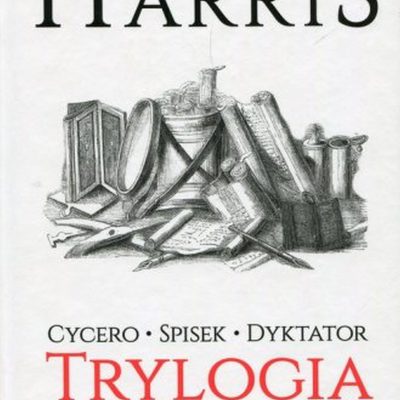The book “Cicero” by Robert Harris is the first part of the “Roman trilogy” about the life of one of the greatest orators in history and great Roman politicians and lawyers. Thanks to this position, we will move to the 1st century BCE, when the Roman Republic was going through a crisis and signaled its inevitable collapse.
When approaching the title, I expected that I could count on an interesting plot, neat language and professional reliance on sources. The author is a well-known British writer who has many historical novels to his credit; not only focusing on the history of Rome. And honestly, I have to say that I was not disappointed. The plot draws you in, and the complicated relations of the political world of Rome are presented in a really interesting way.
The first part of the trilogy, like the other volumes, is a form of memoir of Cicero’s personal secretary and slave – Tiro – who, having outlived his master (he would die only at the age of 99), wanted to answer the question: “what kind of man was Cicero” at the end of his life. The author of the story recounts the moment when they met, how Cicero “borrowed” him from his father for an expedition to the East for education, and how he never returned it. How their mutual trust and respect gradually turned into friendship, which resulted in the promise of Tyron’s liberation, and thus the fulfillment of his dreams of living in the countryside. Tyron, acting as a personal secretary, was well educated and, thanks to his innovative idea of writing words with signs, developed an extremely effective system of shorthand. This first-ever fast writing system was called “Tyronian characters”. Thanks to it, Tyron was able to write down every speech and make minutes of the meeting. Certainly, as the author of the novel portrayed in the plot, Cicero often had to give up really lucrative offers for his slave. He was to refuse even Crassus himself – the richest Roman at that time.
The novel, however, is largely intended to show the path of the “new man” (homo novus), Cicero, to the highest offices in the state. The young lawyer, whose ancestors had never sat in the Senate, could count only on his hard work, skills and political sense. From the bar and judicial activity, through successive levels of the cursus honorum, finally reaches the highest career level of a Roman politician – the consulate.
What will most shock the casual reader unfamiliar with Roman history, however, is the fact that the political life of Rome is strikingly similar to the modern world. Corruption, buying votes, rivalry, temporary, success-oriented political alliances, ruthlessness and dishonor are epithets that many of us will notice when observing today’s political scene. Robert Harris argues that, apart from democratic structures and rules of social life, modern Western civilization has also adopted these negative aspects.
Robert Harris brilliantly shows the private life of the senator and his “funny” marriage to Terencja, which was full of quarrels and strife. Whenever an argument was imminent, Tyron tried to disappear as fast as he could. However, whenever a great orator stood at a crossroads or lost his faith, he could count on the support of his wife and his immediate surroundings. The author, in my opinion, fantastically showed the life of the senator’s Roman family in the turbulent period of the late Roman Republic.
This position by Harris will certainly remain one of my favorite titles. Many may be discouraged by the plot devoid of wars and blood; however, intrigue and political rivalry play the main role here. The more the reader becomes engrossed in this world, the more he wants to follow Cicero.


